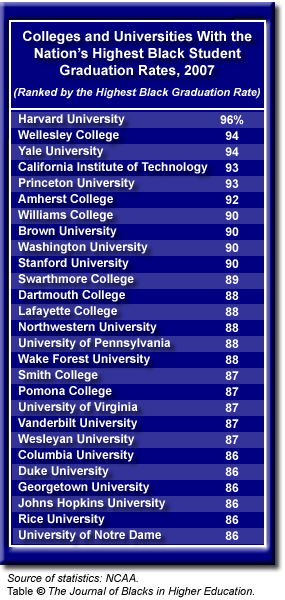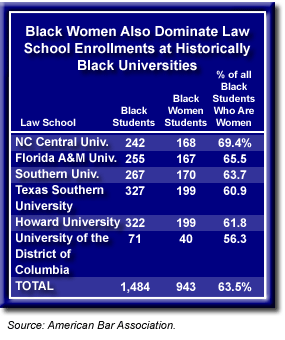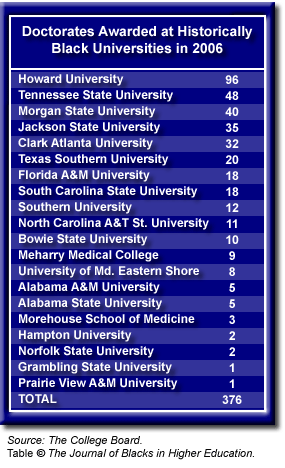Colleges With the Highest Black Student Graduation Rates
For many years Harvard University, traditionally one of the nation’s strongest supporters of affirmative action, has produced the highest black student graduation rate of any college or university in the nation. The 2007 data shows Harvard’s black student graduation rate is 96 percent, again the highest among U.S. colleges and universities. The black student graduation rate at Harvard increased by one percentage point this year.
Yale University and Wellesley College both have a black student graduation rate of 94 percent. Yale improved its black graduation rate by two percentage points this year. Princeton University and the California Institute of Technology both posted black student graduation rates of 93 percent. Over the four-year period from 1997 to 2000, only 14 black first-year students enrolled at CalTech and 13 went on to earn their diplomas. If only one additional black student had not completed his or her degree program, the black student graduation rate would have dropped to under 86 percent.
Amherst College, the small liberal arts college in western Massachusetts, produced a black student graduation rate of 92 percent. This is down two percentage points from a year ago. Williams College, Brown University, Stanford University, and Washington University in St. Louis also posted a black student graduation rate of 90 percent or above.
Overall there are 10 high-ranking colleges and universities with a black student graduation rate of at least 90 percent.
Seventeen other high-ranking institutions have a black student graduation rate of 86 percent or above. All told there are 27 colleges and universities with a black student graduation rate of at least 86 percent. This is considerable progress. A year ago there were 21 colleges and universities with a black student graduation rate of 86 percent or above.


NEW YORK UNIVERSITY

Postdoctoral and Transition Program for Academic Diversity
The Program
New York University (NYU) is dedicated to ensuring that its scholarly community is enriched by individuals, who, through their different races and ethnicities, nationalities, gender identities, age, abilities, political beliefs, spiritual beliefs, economic status, and sexual orientation, contribute to an intellectually challenging and inclusive educational environment. To that end, NYU has created the NYU Postdoctoral and Transition Program for Academic Diversity fellowship program to support promising scholars and educators from different backgrounds, races, ethnic groups, and other diverse groups whose life experience, research experience, and employment background will contribute significantly to academic excellence at NYU.
Eligibility
The fellowship program is open to all areas of study at the University.
Candidates from the following three categories may apply:
- Doctoral students in the final year of their dissertation
- Postdoctoral students who have completed their dissertation within the last three years
- Professionals transitioning to academic careers (in fields for which the doctorate is not the terminal degree)
Awards
NYU will award five in-residence fellowships in 2008. The two-year appointments, which have a possibility of a third-year extension, begin in September 2008. Fellows teach a maximum of one course per semester.
Stipends and Allowances
Fellows receive an annual stipend of $40,000 as well as allowances for housing ($20,000), research ($2,000), and one-time relocation ($3,000). The University also provides a medical and dental benefits package.
All materials must be postmarked by March 3, 2008. Awards will be announced in April 2008.
The fellowship application and instructions for submission are available at http://www.nyu.edu/info/faculty/ms0430
E-mail questions to ptpfellowship@nyu.edu

At the Law Schools at Historically Black Universities, Black Women Are Capturing a Large and Growing Share of Total Enrollments
In last week’s edition, we reported on JBHE’s research showing that over the past six years black women have increased their share of African-American enrollments at the nation’s 50 highest-ranked law schools. This emerging dominance of black women in the legal profession is also taking place at the nation’s six historically black law schools. Women make up a majority of the law students at each of these six schools. At all six of these schools combined, black women make up 63.5 percent of the African-American enrollments. At North Carolina Central University in Durham, black women make up 69.4 percent of the African-American enrollments.
Black women are increasing their share of places at the black law schools at a rate greater than at law schools as a whole. In 2000, 58.8 percent of all black students at these law schools were women.

The New President of Community College of Allegheny County
 Alex Johnson, who was chancellor of Delgado Community College in New Orleans, was named president of the Community College of Allegheny County, which operates 10 campuses in and around Pittsburgh. Blacks make up 15 percent of the 18,000-member student body at the two-year college. Alex Johnson, who was chancellor of Delgado Community College in New Orleans, was named president of the Community College of Allegheny County, which operates 10 campuses in and around Pittsburgh. Blacks make up 15 percent of the 18,000-member student body at the two-year college.
Dr. Johnson is a graduate of Winston-Salem State University. He holds a master’s degree from Lehman College and an educational doctorate from Penn State University.
The Nation’s Most Racially Diverse Bible College
 There are many historically black colleges and universities that maintain affiliations with religious organizations. Many of these institutions continue to train large numbers of black students for the ministry. But at a majority of the Christian colleges, black students are scarce. JBHE research has found that there are at least 33 Christian colleges where blacks are less than 3 percent of the student body. There are many historically black colleges and universities that maintain affiliations with religious organizations. Many of these institutions continue to train large numbers of black students for the ministry. But at a majority of the Christian colleges, black students are scarce. JBHE research has found that there are at least 33 Christian colleges where blacks are less than 3 percent of the student body.
But the College of Biblical Studies in Houston is one of the more diverse institutions of higher education in the United States. Blacks make up 51 percent of the total enrollments at the college. Hispanics are 23 percent of the student body and whites make up 22 percent of all students. There are between 700 and 800 black students on campus each semester. And unlike traditional colleges, students at the College of Biblical Studies are an average age of 36. Most are looking to change careers.
The Growing Racial Scoring Gap on the SAT II
Last week JBHE reported the persisting racial gap on SAT II subject tests. Most discouraging is the fact that the racial scoring gap on these tests continues to widen.
Among the 11 most popular SAT II tests listed in the accompanying table, the racial scoring gap has increased on 10 of the 11 tests over the past eight years. The only exception is the physics test where the racial gap has remained the same at 80 points.
The largest increases have been on the biology and French tests. On the French test in 1999, the racial gap was only 9 points. It has now opened up to 37 points. The gaps have also opened significantly on the Spanish and Latin tests. Thus, while blacks generally do well on the foreign language tests compared to whites, the gap between the two groups is widening on these tests at a faster rate than in other subject areas.

In an Effort to Boost Its Graduation Rate, Fayetteville State University Creates New Academic Qualifications for Admission
 The board of trustees of Fayetteville State University, the historically black educational institution in North Carolina, approved new admissions standards for entering students. Students from North Carolina will now need a score of 750 on the combined reading and mathematics portion of the SAT and will have had to achieve at least a 2.0 grade point average in high school. In five years, students will need to score 800 on the combined SAT and have a 2.5 grade point average in high school. The board of trustees of Fayetteville State University, the historically black educational institution in North Carolina, approved new admissions standards for entering students. Students from North Carolina will now need a score of 750 on the combined reading and mathematics portion of the SAT and will have had to achieve at least a 2.0 grade point average in high school. In five years, students will need to score 800 on the combined SAT and have a 2.5 grade point average in high school.
The average combined SAT score for black students in North Carolina is 851 so most college-bound high school graduates will have little trouble meeting the new admission standards.
Appointments
 • Teresa Hardee was named chief financial officer and vice president for administrative and fiscal affairs at Florida A&M University. She was the assistant vice chancellor for financial planning at North Carolina Central University in Durham. • Teresa Hardee was named chief financial officer and vice president for administrative and fiscal affairs at Florida A&M University. She was the assistant vice chancellor for financial planning at North Carolina Central University in Durham.
• Melvin Roberts was named dean of the division of business, computer, and technical studies at Camden County College. He had served on the faculty of the college for 18 years.
Dr. Roberts is a graduate of Howard University. He holds a master’s degree in chemical engineering from Georgia Tech and a doctorate in education from Wilmington College.
 • Linda R. McAbee was appointed vice chancellor of human resources at North Carolina A&T State University. A graduate of Spelman College, she was the assistant vice president of human resources for Duke University. • Linda R. McAbee was appointed vice chancellor of human resources at North Carolina A&T State University. A graduate of Spelman College, she was the assistant vice president of human resources for Duke University.
Awards
 • Kathryn Morgan, Sarah Lawrence Lightfoot Emerita Professor of History at Swarthmore College, was elected to the Circle of Elders of the National Association of Black Storytellers. Morgan was the first African-American faculty member at Swarthmore College. • Kathryn Morgan, Sarah Lawrence Lightfoot Emerita Professor of History at Swarthmore College, was elected to the Circle of Elders of the National Association of Black Storytellers. Morgan was the first African-American faculty member at Swarthmore College.
 • Tomorrow evening Margaret C. Simms, senior fellow at the Urban Institute, will receive the Samuel Z. Westerfield Award at the annual meeting of the National Economic Association in New Orleans. The award recognizes excellence in public service and policy. • Tomorrow evening Margaret C. Simms, senior fellow at the Urban Institute, will receive the Samuel Z. Westerfield Award at the annual meeting of the National Economic Association in New Orleans. The award recognizes excellence in public service and policy.
Simms holds a master’s degree and a Ph.D. in economics from Stanford University. She has served on the faculty of Atlanta University, Clark Atlanta University, and the University of California at Santa Cruz.
• The University of Virginia received the Peterson’s Award for Innovation in Promoting an Inclusive Graduate Community from the Council of Graduate Schools. The award is given to institutions to identify, recruit, retain, and graduate minority graduate students.
|
How Will the New Harvard Financial Aid Plan Affect College-Bound African Americans?
See JBHE's analysis by clicking here
|
MIT Scientists May Have Found a Breakthrough in the Fight Against Sickle Cell Anemia
 One in every 500 African Americans will contract sickle cell anemia. Scientists believe that the gene, which makes African Americans more susceptible to the disease, is a product of evolution as it helps protect against malaria, a disease common in equatorial Africa. One in every 500 African Americans will contract sickle cell anemia. Scientists believe that the gene, which makes African Americans more susceptible to the disease, is a product of evolution as it helps protect against malaria, a disease common in equatorial Africa.
Researchers at the Massachusetts Institute of Technology have made what could be a major breakthrough in finding a cure for sickle cell anemia. The research team, led by MIT professor of biology Rudolf Jaenisch, has successfully treated mice by reprogramming their stem cells. The cells were modified using retroviruses customized to insert genes into the cells’ DNA.
The researchers caution that many obstacles must be overcome before the technology can be applied to human subjects. This is because the introduction of retroviruses can produce other genetic changes which are unpredictable.
Nevertheless, the new research at MIT gives hope to the thousands of African Americans who suffer from sickle cell anemia.
  |
“Some historically black institutions are doing a good job graduating black students. We’re not doing something right.”
— Lloyd V. Hackley, interim chancellor of Fayetteville State University, announcing new academic qualifications required for admission in an effort to boost the university’s 40 percent graduation rate (see story below)
|
Only 4 Percent of Duke University’s Early Admits Are Black
 Apparently, in response to Harvard and Princeton’s eliminating their early admissions programs, many other highly ranked universities have seen a surge in early applicants. For example, Yale reported a 36 percent increase in early applicants this year. The University of Chicago had a 42 percent increase in early admission applications. Apparently, in response to Harvard and Princeton’s eliminating their early admissions programs, many other highly ranked universities have seen a surge in early applicants. For example, Yale reported a 36 percent increase in early applicants this year. The University of Chicago had a 42 percent increase in early admission applications.
But at Duke University, early applicants increased by only 5 percent. The university accepted 472 students during the early decision process. The early decision students will make up 28 percent of the incoming class.
Duke reports that 25 percent of all early acceptances are “students of color.” This is a record high percentage for the university. However, only 20 of the 472 students accepted early are black. Thus, at Duke, blacks made up only 4.2 percent of all students admitted early.
JBHE research has shown that many black students do not participate in the early admissions process because it restricts their ability to negotiate financial aid packages among competing institutions.
Black Studies Dispute at Rutgers University
 Walton R. Johnson resigned as chair of the Africana studies department at Rutgers University in protest of the university’s plans to transfer some faculty members to another department. The scholars of African languages and literature would be moved to a new department of African, Middle Eastern, and South Asian languages. Walton R. Johnson resigned as chair of the Africana studies department at Rutgers University in protest of the university’s plans to transfer some faculty members to another department. The scholars of African languages and literature would be moved to a new department of African, Middle Eastern, and South Asian languages.
The two scholars who would be moved to the new department have voiced support for the plan. But Professor Johnson believes the plan is a subtle attempt to begin the dismantling of black studies at Rutgers.
New Institute to Focus on Issues of Equity in Higher Education
 The Association for the Study of Higher Education (ASHE) at Michigan State University has announced the establishment of a new research group to study ways to eliminate racial inequality in higher education. The new organization is called the Institute on Equity Research Methods and Critical Policy Analysis. Its mission is to create greater inclusion of minorities in higher education, transform higher education policy centers to give greater attention to the needs and interest of minority communities, and to develop greater recognition for minority scholars who are experts on public policy issues. The Association for the Study of Higher Education (ASHE) at Michigan State University has announced the establishment of a new research group to study ways to eliminate racial inequality in higher education. The new organization is called the Institute on Equity Research Methods and Critical Policy Analysis. Its mission is to create greater inclusion of minorities in higher education, transform higher education policy centers to give greater attention to the needs and interest of minority communities, and to develop greater recognition for minority scholars who are experts on public policy issues.
Seed money for the new institute was provided by a grant from the Ford Foundation. The institute will be a collaborative effort between ASHE, the Higher Education Research Institute at UCLA, the Institute for Higher Education Law and Governance at the University of Houston, and the Center for Urban Education at the University of Southern California.
  |
46.4% Percentage of white high school students in 2005 who said they had an alcoholic drink within the past 30 days.
31.2% Percentage of black high school students in 2005 who said they had an alcoholic drink within the past 30 days.
source: U.S. Department of Education
|
Carnegie Corporation Aims to Increase Science and Engineering Faculty at Universities in Africa
 The Carnegie Corporation of New York announced the establishment of a new initiative to increase the number of well-trained science and engineering faculty at universities in Africa. The Africa Regional Initiative in Science and Education will seek to train scholars in specific science-related disciplines with emphasis on preparing them to teach. The Carnegie Corporation of New York announced the establishment of a new initiative to increase the number of well-trained science and engineering faculty at universities in Africa. The Africa Regional Initiative in Science and Education will seek to train scholars in specific science-related disciplines with emphasis on preparing them to teach.
The new program, administered by the Institute for Advanced Study in Princeton, New Jersey, will be funded through a three-year, $3.3 million grant.
Doctorates Awarded by Historically Black Universities
In 2006 historically black colleges and universities awarded 376 doctorates to recipients of all races. This was a slight increase over the 367 doctorates awarded by black universities in 2005.
In 2006 Howard University awarded 96 doctorates, the most of any historically black university. The Howard total was down slightly from the prior year.
Tennessee State University awarded 48 doctoral degrees in 2006. This ranked the university in second place among historically black institutions. Morgan State University awarded 40 doctorates in 2006. This was a 60 percent increase from the previous year. Jackson State University University and Clark Atlanta University each awarded more than 30 doctorates in 2006. Florida A&M University, South Carolina State University, Bowie State University, Southern University, North Carolina A&T State University, and Texas Southern University were the only other black universities to award at least 10 doctorates in 2006.


OBERLIN COLLEGE

Vice President for Communications
Oberlin College is seeking a Vice President for Communications to serve as chief communications, public relations and integrated marketing strategist for Oberlin College and the Conservatory of Music. As a member of the President's senior staff, the Vice President will set college communications policies and provide current, key messages to assist college faculty, staff and administrators—in their interactions on- and off-campus—in fostering a better understanding and appreciation of the college by its various publics. He or she will ensure that the campus community is informed regularly about important college decisions, programs and new achievements that become part of the Oberlin story. The Vice President will also collaborate with the alumni and development offices to strengthen ties with Oberlin alumni by developing relationships that inform new, richer interactions and communications with them. Entire description: www.oberlin.edu/HR.
Requirements: Bachelor’s degree; advanced degree preferred; fifteen-plus years of progressively responsible, senior-level managerial and supervisory experience in complex organizations; excellent writing, newswriting and editing skills; solid grounding/experience in two or more of the core functions managed by the Vice President (media relations, publications direction, web, branding oversight, etc.).
Submit letter of application and résumé in digital form (document or PDF format preferred) by 1/31/08, to Virginia O'Dell at Ginny.O'Dell@oberlin.edu. AA/EOE

Very Few Black Economists Teaching at the Nation’s Largest Universities
 Over the past 15 years JBHE research has shown that there are few black scholars teaching economics at the nation’s highest-ranking universities. The small presence of black faculty in economics is confirmed by new research by Donna Nelson, an associate professor of chemistry at the University of Oklahoma. Over the past 15 years JBHE research has shown that there are few black scholars teaching economics at the nation’s highest-ranking universities. The small presence of black faculty in economics is confirmed by new research by Donna Nelson, an associate professor of chemistry at the University of Oklahoma.
Professor Nelson’s research finds 42 blacks teaching at the 97 universities with the nation’s largest research budgets in economics. All told there are 2,360 economics faculty at these 97 universities. Therefore, blacks make up 1.8 percent of all economics faculty at these institutions.
There are three black economists at Georgia Tech. There are two black economists at New York University, the University of Central Florida, the University of Massachusetts at Boston, and Tufts University.
Of the 42 black faculty members teaching economics at these 97 universities, 19 hold the rank of full professor.
In Memoriam
William Russell Adams Jr. (1936-2007)
 William R. Adams Jr., a lawyer, educator, and journalist, died recently from heart failure at Pennsylvania Hospital in Philadelphia. He was 71 years old. William R. Adams Jr., a lawyer, educator, and journalist, died recently from heart failure at Pennsylvania Hospital in Philadelphia. He was 71 years old.
A graduate of Cheyney University of Pennsylvania, he taught high school and worked as a newsman for a local radio station for several years before accepting a position as lecturer in English at the University of Pennsylvania. He also served as associate dean of admissions and director of minority recruitment at Penn.
Allen and his wife Carol Black both entered the University of Pennsylvania law school in 1976. After graduating in 1979 they opened the firm Black & Adams in Philadelphia. For over a quarter of a century the husband-wife team handled a wide range of litigation including many civil rights cases.
In his later years, Adams continued to teach as an adjunct professor of English at Lincoln University of Pennsylvania. He retired and closed the law practice in 2004.
Richard Fowler Tyson (1928-2007)
Richard Fowler Tyson, who in 1949 filed a racial desegregation lawsuit against the University of Maryland, died from a stroke last month at his home in Columbia, Maryland. He was 79 years old.
Dr. Tyson was a 1947 graduate of Morgan State University. In 1949 he applied to the School of Pharmacy at the University of Maryland but was denied admission because of his race. He filed suit but lost the case. He went on to earn a master’s degree in science education from Columbia University.
After serving in the Army, he entered Howard University School of Medicine, completing his training there in 1963. He opened a family practice in Columbia in 1969.
In addition to his practice, Dr. Tyson served as an adviser to medical students at Johns Hopkins University and the University of Maryland. He also was a mentor for students in the Meyerhoff Scholar Program at the University of Maryland Baltimore County.
Grants
• Syracuse University received a five-year, $3 million grant from the National Science Foundation to administer a program to attract more black and other minority graduate students to a consortium of colleges and universities in upstate New York. Participating institutions are Clarkson University, Cornell University, Monroe Community College, Onondaga Community College, Rensselaer Polytechnic Institute, and Rochester Institute of Technology.
 • Spelman College, the historically black college for women in Atlanta, received a $500,000 grant from the National Science Foundation to increase the number of students studying in the fields of computer science and robotics. The grant program is under the direction of Andrew B. Williams, an associate professor of computer and information sciences. • Spelman College, the historically black college for women in Atlanta, received a $500,000 grant from the National Science Foundation to increase the number of students studying in the fields of computer science and robotics. The grant program is under the direction of Andrew B. Williams, an associate professor of computer and information sciences.
|
 .
.